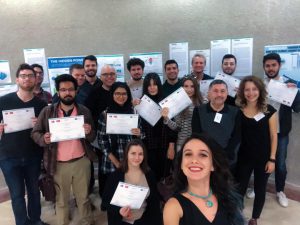
Last week, a group of Communication and Design students participated in a training program that will enable them to help middle and high school students learn about renewable energy and other topics related to climate change. The training program was the second stage of the international Erasmus Plus project “POWER: Empowerment of Youth on Renewable Energies for Sustainable Societies.”
The first stage had focused on the development of a training concept based on peer-learning methodology, which takes the approach that middle- and high-school students accept knowledge much more readily if they receive support from young instructors they can relate to as peers. This stage of the process culminated in the creation of a poster exhibition by students in the Department of Communication and Design course “Science Writing and Journalism,” directed by Asst. Prof. Lutz Peschke. The exhibition was then evaluated by means of a reception study at Bilkent University and the University of Tilburg in the Netherlands. A transnational meeting in Vienna last August concluded the project’s first stage.
In the second stage, 35 Bilkent COMD students were trained as peer learning instructors by the POWER project’s international consortium. Over three days, October 15–17, experts from Germany, Spain and Austria instructed them in the field of renewable energies communication, with students learning how to support middle and high schoolers in their own learning process concerning the vitally important topic of renewable energy.
During the next three months, the poster exhibition created during the first stage of the project will be presented at science events in Çanakkale, Trabzon, İzmir, Iğdır and Hatay, where the young peer-learning instructors will guide middle and high school students through the exhibition.
POWER is a project of the Erasmus Plus program’s Strategic Partnership for Youth. Along with the Bilkent Department of Communication and Design, project partners are the Ankara Provincial Directorate of Environment and Urbanization, which coordinated the project; the private research center Open Evidence in Barcelona, Spain; the iserundschmidt Agency for Science Communication in Bonn, Germany; the Vienna University of Technology; and the consulting and engineering company TERA Ankara.
